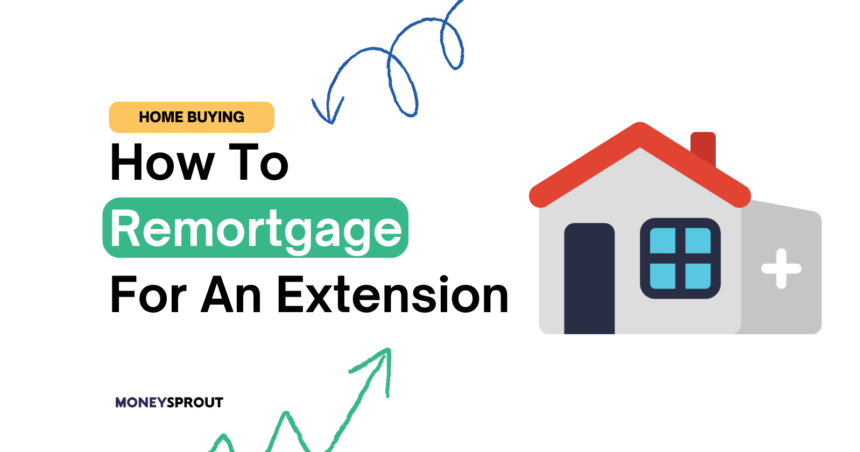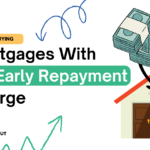You want more space in your home, maybe because you’re having a baby, need an office or just feel a bit cramped. But you don’t want to move house and you don’t have spare cash available for an extension. You may actually be able to remortgage for an extension – here is everything you need to know before attempting to do so.
Quick Overview
Before you remortgage for an extension you will need to take into account how much the extension costs, whether you can afford it, what your credit score is and how much equity you have in your home. These factors will help you determine whether or not your mortgage provider will lend you the money for your extension. You should also consider your other options in case remortgaging is not the best decision for you.
Can I Remortgage for an Extension?
It is perfectly possible for somebody to remortgage for an extension, at least in theory. Whether you personally can remortgage or not depends on your financial circumstances and credit history, as well as the lender’s requirements.
If you have been in your property for a while (at least a few years), and have paid off a large chunk of your mortgage already, you will find it easier to remortgage than somebody who has just moved in.
This is because you will own more of your home outright and won’t be asking to borrow loads more money on top of a new and expensive mortgage. You will also be considered reliable because you will have been making your payments on time each month. Therefore a lender is more likely to trust you to continue to do so.
However, you are less likely to be able to remortgage if the extension you want is very expensive and you have either not paid off a lot of your mortgage, or you have missed or made multiple late payments. The lender may think that you can’t afford the extension and deny your request. It is a good idea to fully understand how remortgaging for an extension works before applying.
How Remortgaging for an Extension Works
Remortgaging for an extension is simply where you take out a loan on your home against the equity you have in it. You then use this cash to pay for your extension. The money you owe is added to your mortgage; you pay it back as part of your monthly mortgage repayments.
Doing this means that you will owe more money on your mortgage and therefore take longer to pay it back, with potentially more interest – depending on the rate you are able to get. You will also own less equity than you did in your home. For some people, this can feel like taking a step backward. For others, it is a way of getting the extra space they need without having to leave a house they have spent time and money turning into a home.
Remember, you don’t have to stick with your current mortgage provider when you remortgage, if you don’t want to. Shop around to see what options are available to you with different lenders by looking at comparison websites and speaking to a mortgage broker.
Our favorite online mortgage broker is Habito. You can check them out below:
Buying a home and arranging a mortgage is a complicated process. Habito is a free service that makes buying a home easy. They have access to over 20,000 mortgages from 90 lenders allowing you to get the best deal on a mortgage.
Best of all, the service is free as Habito gets paid by the lenders.
- Free mortgage comparison service
- Provides a complete home buying service
- 4.8 Stars on Trustpilot (8,374 Reviews)
- 20,000 Mortgages and 90 Lenders available
Factors to Consider Before Remortgaging
Remortgaging your home to get an extension is a major decision that can impact you and your family’s lives for a long time. Consider these five factors carefully first:
- Will you devalue your home? You might think that adding an extension will add value to your home. In a lot of cases, it does, especially if you are adding a full-height extension with multiple rooms. But some extensions can actually devalue your home, especially if they are cheaply made and aren’t considered to be a proper room.
- Are you still at the beginning of your fixed-term mortgage? If you have just gotten a mortgage on a new property, chances are you haven’t had time to pay much of it off. You won’t own much equity in your home, so adding another loan on top of your current mortgage repayments might not be the best idea.
- Can you afford it? Extensions can be very expensive, especially if they are the type to add significant value to your home. Consider whether you can actually afford the extension carefully. If you can’t, it is best to wait a bit and maybe save up some cash for it.
- How disruptive will the extension be? Extensions take at least 8 weeks on average and some can take over 3 months. You won’t be able to use whichever part of the house is being extended for this period. This might not matter to you if the builder is simply adding a glass conservatory to the back hall. But if your kitchen is out of action for months, you won’t be able to cook.
- Are you subject to early repayment charges? If you remortgage before your fixed-term mortgage is up, you may have to pay a fee. Check with your lender to see if you are subject to early repayment charges and how much these are. Potentially your extension can wait until the end of your mortgage term to avoid paying these. This may also give you time to save up some cash towards your extension, allowing you to borrow less.
Will My Application to Remortgage Get Accepted?
Once you have decided that you definitely want to go ahead with remortgaging to get an extension, you have to formally apply with your lender of choice. Below are the things lenders will consider when looking at your application.
Cost of Your Extension
Firstly, they will want to know what your plan is for your extension and how much it costs. This is because they like to be fully informed before making a decision on whether to lend somebody money. A quote for the cost of your extension will reassure them that you are not asking for more cash from them than you need. The plan for your extension will give them an idea of how much (if any) value the extension will add to your home.
Income and Expenses
The lender will also check your income and expenses to see how much spare cash you have left over at the end of the month. This is in order to decide whether you can actually afford to meet your new monthly mortgage repayments. If they don’t think you can afford the extra loan, they might either deny your application or offer you a smaller amount of money. You may consider holding off on your extension for now or compromising on a cheaper one if this happens.
Credit History
Your credit history will play a part in the lender’s decision. Just because you were approved for a mortgage previously, does not guarantee that you will be this time around. Before you apply to remortgage, look at your credit score. Has it improved, or gotten worse since you took out your current mortgage? If it has improved it is likely that you will be able to access the money you need at a good rate. But if your credit score has decreased, you may find yourself being rejected.
Applying for any form of credit leaves a mark on your credit history. Making lots of applications in a short space of time because you keep getting rejected means you risk damaging your credit score. Avoid this by checking your credit history before applying for a remortgage. If your credit score is low, you may want to build it up first.
Loan-to-Value Ratio
The final thing a lender will consider is the loan-to-value ratio. This is essentially how much equity you own in your home versus how much money you need for your extension. It is quite easy to calculate this by taking the amount you still owe on your mortgage away from how much the property is worth.
For example: Jenny has a house worth £300,000. She has paid back £150,000 of her mortgage. Therefore she owns £150,000 equity in, or 50% of, her home. The loan-to-value ratio is 50%.
The lower your loan-to-value ratio, the higher chance you have of your application being accepted. If you have only paid off a small amount of your home, say, 10%, you may struggle to access good interest rates when you remortgage, or you may be rejected outright.
Think About Your Other Options
Remortgaging is one way to finance your extension. But there are other options that might be better for your personal circumstances.
- Saving up the cash: Sometimes the safest option is to save up until you can afford the extension outright. This way you will hopefully add value to your home without having to borrow for it. But if you need the extra space urgently and don’t have the cash, there are other ways you can access finance without remortgaging.
- Taking out a loan: Adding the cost of your extension to your mortgage isn’t the only way you can access a loan. You could take out a personal, or joint loan with your partner, to finance it instead. This will mean that you don’t have to change your mortgage and lose equity in your home. However, you will have to pay the loan back alongside your mortgage, so make sure you can afford it.
- Borrowing from family or friends: If you are lucky enough to have family or friends who can lend you the money for your extension, borrowing from them may be a cheaper option. You won’t have the worry of paying back extra on top of your mortgage or managing multiple loans. Just be careful when doing this because money can cause arguments and you don’t want to fall out with somebody you care about.
- Moving house: Adding extra rooms can be as time-consuming and expensive as simply moving to a home that suits you better. But if you are absolutely set on staying where you are, an extension may feel like your only option.
Final Thoughts
You should be absolutely sure that remortgaging is the right way to fund your extension, so consider all your options carefully. If you want to go ahead, there are quite a few steps to the application process. You will need to get a good idea of your plans and the cost in order to tell the lender about them. It is also a good idea to shop around in order to find the best deal available to you. All in all, adding an extension to your home is a stressful business. But if you need the extra space for a growing family or home office, you may find it well worth it.
Read More From Money Sprout:





